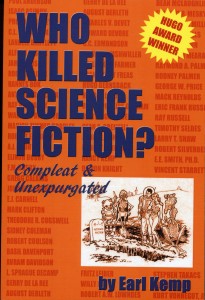I just finished skimming through a fascinating little bit of fannish history, Earl Kemp’s Who Killed Science Fiction? Fannish in the sense of science fiction fandom. It has a rich and varied history and the concerns within the genre are as fraught with angst, ennui, and ambition as any literature.
 I am always a bit bemused when I read about this sort of thing, because I came into science fiction through the rotary rack at my local drug store. (Literally—Leuken’s Pharmacy, on the corner of Shenendoah and Compton, a good old fashioned drug store with a soda fountain, a magazine stand, and two circular racks for paperbacks, two blocks from my house.) I had no idea about where these books came from, who wrote them, how, not to mention the whole publishing industry and its workings. I used to think authors were “gray eminences” who occasionally deigned to write a new book and “gift” it to the public. The notion that they did it for money or to meet a contract deadline or anything so mundane never occurred to me. It was a wholly mysterious process, with arcane rituals and secret rites.
I am always a bit bemused when I read about this sort of thing, because I came into science fiction through the rotary rack at my local drug store. (Literally—Leuken’s Pharmacy, on the corner of Shenendoah and Compton, a good old fashioned drug store with a soda fountain, a magazine stand, and two circular racks for paperbacks, two blocks from my house.) I had no idea about where these books came from, who wrote them, how, not to mention the whole publishing industry and its workings. I used to think authors were “gray eminences” who occasionally deigned to write a new book and “gift” it to the public. The notion that they did it for money or to meet a contract deadline or anything so mundane never occurred to me. It was a wholly mysterious process, with arcane rituals and secret rites.
Nor were all books created equal in my mind. For some reason—purely aesthetic—I early on decided that the best science fiction, the stuff with true weight and merit, was all published by Avon. They did Asimov’s magisterial Foundation Trilogy, after all, and that was Significant Literature! They put out a lot of Zelazny and some Silverberg.
But I knew nothing about fandom. Occasionally I’d see a notice in the back of one of the magazines I read—If, Galaxy, Amazing, Fantasy & Science Fiction, Vertex, Venture—for a convention somewhere, usually a “World Science Fiction Convention” (!), but I thought they would necessarily be by invitation only (where all the gray eminences met to determine the future offerings, etc) and I’d never go to one.
Kemp’s little tome is the result of a survey he sent out around 1960, asking the title question, among others. Damn. I started reading the magazines regularly around 1963 or ’64, so if already in 1960 there was concern over SF being dead, then…
Most of the seventy-odd respondents thought SF was not dead at all, but was in the doldrums. This was right after the so-called Golden Age has ended (roughly between 1938 and 1954 or so) and there was apparently a sense that the Next New Thing hadn’t arrived yet and maybe it wouldn’t. It was right on the cusp of New Wave and a few years before Campbell changed the name of Astounding to Analog. There’s the sense of people sort of milling around, waiting for Something To Happen.
Well, it was five years before Dune and seven years before Dangerous Visions, two books that arguably changed the field. In a way they represent two extremes, the last great epic of traditional SF and the compendium of All The Wild Shit coming down the pike. (Both books are almost continually in print to this day, and while Dune has become more a media and franchise phenomenon, Dangerous Visions and its sequel is still a touchstone for serious literary study and the taking-off point for the changes in approach and trajectory that drove everything until Gibson, Sterling, and Cyberpunk worked another set of changes on a field that has always been as good as its most recent thing.)
The general consensus throughout the responses was that magazine SF was not dead (and there did seem to be an over-emphasis on the magazines, which at the time were still seen as the major outlet for SF. Book publishers had not yet really crowded into the field as they did by the end of the decade, although some were putting out quite a lot, like ACE) but it was sick as hell. I’ve sat in on similar conversations over the last three decades of my own involvement in fandom and I was struck reading this by the similarity in tone and even in content of the arguments. (Horace Gold, editor of Galaxy, thought everything was fine except for too much psi.)
Kurt Vonnegut chimed in with a particularly venomous assault, that not only was it dead but he would be glad to help find the corpse so it could be properly buried. He wrote a note to Kemp later apologizing and blaming his attitude on his isolation from the field. Vonnegut made his bones in SF and took many opportunities to diss it because he didn’t want to be regarded by the critics—and therefore his potential audience—as a hack. Fair enough, but sometimes I wonder if something else was going on there. He could have distanced himself without pissing all over the whole genre. Or maybe not. I have to bear in mind that the critical arena is not what it was then.
The last section of the book contains revisitations some 20 years later, when science fiction was going through an enormous boom. Some of the pessimism of the earlier responses had to be explained.
A lot of of them credited Star Trek with the “revival” of science fiction. It did bring a much larger audience into the field. It did open the door for many of those new readers to discover that, as good as they thought Star Trek was, the stuff between two covers was much better.
That all changed again in the 80s with the massive upsurge of Fantasy, all, in my opinion, in the wake of Star Wars, which did something very similar—brought many tens of thousands of new fans eagerly into the field. But in this instance, a different realization occurred that led to a collapse of science fiction. Instead of discovering that the material in the books they were now buying was better than Star Wars, they found that it was utterly different—and that they really didn’t like it.
Star Wars—and I’ve said this before, often—is not science fiction (even though Lucas rather hamfistedly and stupidly tried to retrofit it as science fiction in the “first” three movies) but heroic quest fantasy in space. Or, simply, Fantasy in Skiffy drag. Audiences went from this to the less reifying work of writers like Brin, Bear, Clarke, Benford, Cherryh, et al and it must have been like a cold shower. Science fiction requires thought, analysis, its virtue is in the explication and championing of reason, logic, and science, and while there are heroes aplenty in SF there’s not a lot of destiny or “born to the throne” heroes who just Are.
As fast as they blew up the SF bubble, they left it for all the Tolkein clones that began to dominate the publishing field by the late 80s and still command a hefty market share.
Science fiction, it seems to me, has always been a minority taste. It appeals to people who also find science appealing. It has always had a fairly solid core of supporters and as a percentage of the publishing market has remained fairly constant, with certain boom times punctuating a more or less steady, dependable foundation. Science fiction offers marvels, of course, but they are, the best of them, marvels still grounded in an idea of reality. And reality is tough. It takes work to survive and thrive. A good sword arm won’t do you much good when a meteor has holed your ship and all the air is leaking out and you have to figure out how to fix it. Orbital mechanics couldn’t care less that you’re of the House Royal as your ship starts spiraling down to a nasty end because you didn’t do the math right for re-entry into atmosphere. Science fiction says “Yes, the future can be wonderful—but it will still be Real and you’ll have to deal with it the same way you deal with what’s real now.”
So, who killed science fiction in my opinion?
Lot of assumptions in that question with which I do not agree.

